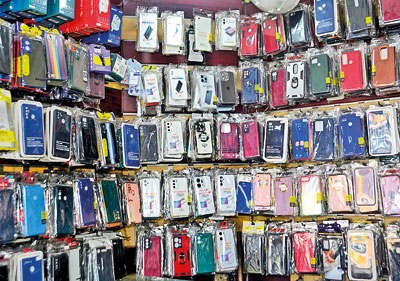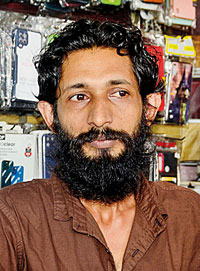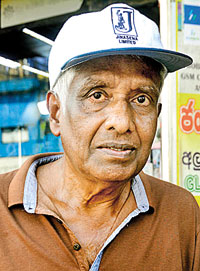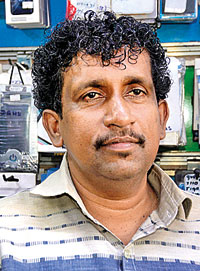News
Increased tax burden piles on further cost pressures
View(s):By Senuka Jayakody
Anuradha Tennakoon, president of the National Agrarian Unity, criticised the Government. “How can an agricultural country run by taxing agriculture?” he asked.
The price of a 50 kilo bag of chemical fertiliser would increase from Rs. 8,500 to Rs. 10,000 and the cost of a “Bhuthaya” machine would increase from Rs. 7.8 million to Rs. 8.5 million. Households would also suffer as a kilogram of rice will potentially rise from Rs. 250 to around Rs. 275.
Buddhi Marambe, senior professor of the department of agriculture of the University of Peradeniya also expressed concerns noting that food security, food production and accessibility would be affected.

Some proprietors of mobile phone and electronics accessories stores in Pettah, expressed positive views on the VAT. Pix by Priyanka Samaraweera
“I do understand that the Government requires finances and even if it would not be a kind of a disaster, the Government should be more sincere in supporting the farming community.’’
Cryshantha Jayawardana, president of the Coconut Growers Association of Sri Lanka, said prices would increase by around 25%. “To increase exports, we need a specific policy to walk upon, which we do not have.’’
Sujeewa Dhammika, chairman of the National Animal Producers Unity, said that prices of all dairy products including butter, cheese and ice cream, which provide nutrition for children, will rise and lead to potential “malnutrition in children”.
“In Europe, farmers feed their cows hay and produce milk. In Sri Lanka, we have all the resources and the perfect weather, but the industry is liable to the VAT,” he said.
The principal of Ernst & Young Sri Lanka, Velauthapillai Shakthivel said that the impact of the VAT on businesses can be foreseen in distinguished scenarios.
Businesses affected due to the removal of exemptions are now required to register for VAT.
Businesses may also face the challenge of pricing. They would only be able to survive if they persist and are capable of capturing the market.

M. M. M. Mihiraj
Further, taxpayers with past stocks procured by using exemptions, and which are to be supplied after January 1, will face challenges in claiming input credits on goods procured using exemptions before the given date.
Businesses already registered and are liable for VAT may experience a neutral impact given that the proposed increase in the rate of VAT to 18% would be cancelled out with the input VAT.
M. M. M. Mihiraj, proprietor of Mehnaz, a mobile phone and electronics accessories store in Pettah, expressed positive views on the VAT. He said people will import fewer items, preventing the sale of electronic items everywhere including on the pavement.
Herman Kumara, the convener of the National Fisheries Solidarity Movement, said the VAT arrives just as many fishermen are leaving the industry.

Nihal Perera
“Many have obtained labor jobs and some are attempting to emigrate. Under these circumstances, the VAT would put further economic pressure on fishermen,’’ he said.
Lalith Dharmasekara, president of All Island Three Wheeler Drivers Union, said that they would have to increase fares.
Meanwhile, Lalith Chandrasiri Fernando, president of All Ceylon Children’s Transport Association, said transport fees will have to be raised from February.
Gemunu Wijeratne, chairman of Lanka Private Bus Owners Association, said that they would be paying an extra Rs. 2 million for a bus and would have to increase fares, even when it is “unfair to the people”.
The secretary of the Association of Container Transporters, Nimal Amarasekera said prices will be increased from January, because not only diesel, but lubricants and spare parts are also affected.
Samantha Indeewera, president of the Sri Lanka Book Publishers Association, said VAT on books would hinder the education of children and thereby, the future of the country. “This is a tax on intelligence.’’
SJB Lawmaker, Dr. Harsha De Silva, told the Sunday Times, that fewer ambulances would be imported, expressing his distress over the taxes on Suva Seriya, the “most efficient” service in Sri Lanka.

Samundra Prageeth
“I do not understand the logic. How much money are you going to get from taxing ambulances? How do you value the service of an ambulance and the life of a person?”
The spokesman of the Government Medical Officers Association, Chamil Wijesinghe, said doctors affected by direct taxes would also be burdened, causing more doctors to leave.
“The health sector in Sri Lanka is in a precarious situation but the Government is not prioritising it to save the lives of citizens.’’
Asela Sampath, president of All Island Restaurant Owners Association, said prices will have to be increased because ingredients will cost more. “This is ultimately unfair to the customer.’’
“People would fall into a state of suffering even more. We cannot even live from next year onward,’’ penssioner Nihal Perera, 70, said.
Store worker, Samundra Prageeth said: “The VAT would be very difficult for us. I pay Rs. 250 for a one and a half kilometre ride in a three-wheeler already and that would increase with the VAT, too.’’
The best way to say that you found the home of your dreams is by finding it on Hitad.lk. We have listings for apartments for sale or rent in Sri Lanka, no matter what locale you're looking for! Whether you live in Colombo, Galle, Kandy, Matara, Jaffna and more - we've got them all!

